Historically, journalism ethics has been parochial with its standards applying to particular groups or regions. The globalization of information raised with new media technologies can enable a country's media coverage to be quickly integrated into the complex network of global political and cultural interactions via the Internet. With global reach comes global responsibilities, journalism ethics need to be transformed from the previous regional media ethics based on print and broadcasting to a global journalism ethics derived by the new communication technologies. Under the age of COVID-19 pandemic, restructuring of the global economy and emergence of deglobalization is a fact, the rise of populism and nationalism challenges the impartiality and objectivity in journalism. The globe is connected electronically and collided perspectively never like before. In such a climate, the role of media constitution and the need for global journalism ethics is due not only the technological innovation; it is due to the changes in the world that public inhabits: global crises such as the ecological deterioration, the wide gap between the rich and the poor, the ravages of infectious diseases have become problems that are difficult for individual countries or nations to solve, and mankind has formed a community of linked destinies and shared futures. Biased and parochial journalism can wreak havoc in a tightly linked global world.
This paper examines the coverage of “2020 Wuhan Lockdown” in American and Chinese mainstream media in both U.S. (The Associated Press) and China (XINHUANET). Based on framing theory, distinct character and differed news disclosure was founded in these reports. In this case, the traditional media in China intended for social stability massively use constructive disclosure, while the U.S. media focused on the damage to Wuhan citizens and emphasis the spectacle of disaster rendered in the perspective of the “Other”. Cosmopolitan ethics asserts the equal valve and dignity of all mankind. Media is increasingly influential in international public affairs, the aim of this paper was to validate the U.S. and Chinese media coverage discrepancies and disclosure bias by comparing the case of “Wuhan Lockdown” happened in the beginning of Covid 19, at the same time called for global journalism ethic. Collectivism and individualism were also discussed. Journalism with a cosmopolitan perspective is need to help citizens understand and discuss global issues such daunting global problems and international relations, media streaming plays a very important role, especially in promoting solutions to global problems, seeks fair terms of cooperation among nations. In the Post-Covid era, facing many challenges in this multi-polar society, it is clear that the construction of global journalism ethic will be a long-term process and require massive dialogue between different cultures.

 京公网安备 11010802039275号
京公网安备 11010802039275号